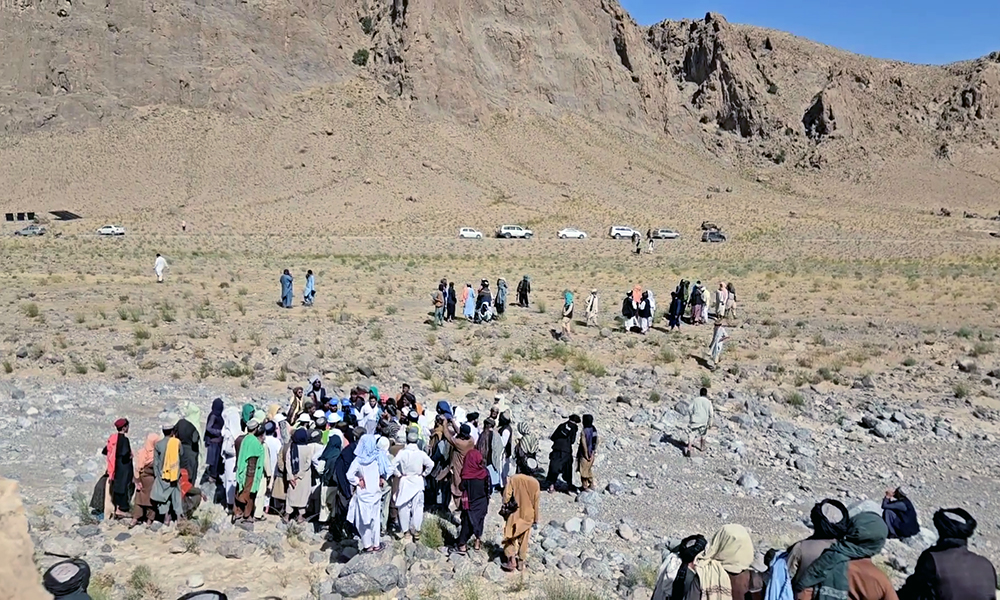Climate Change
India searches for 23 missing soldiers after intense rain and flash flood

The Indian army said Wednesday that 23 soldiers were missing after a powerful flash flood caused by intense rainfall tore through a remote valley in the mountainous northeast Sikkim state.
A video released by an Indian army spokesman showed a thick torrent of raging brown water sweeping down a thickly forested valley, with roads washed away and power lines ripped down.
"Due to sudden cloud burst over Lhonak Lake in North Sikkim, a flash flood occurred in the Teesta River... 23 personnel have been reported missing and some vehicles are reported submerged under the slush," the army said in a statement. "Search operations are underway."
The area is close to India's border with Nepal and China and boasts a sizeable military presence. Lhonak Lake sits at the base of a glacier in the snowy peaks that surround Kangchenjunga, the world's third-highest mountain, AFP reported.
The army said water released upstream from the Chungthang dam meant the river was already more than 4.5 meters higher than usual.
India has been wary of its northern neighbor's growing military assertiveness and their 3,500-kilometer shared frontier has been a perennial source of tension, with parts of Sikkim claimed by Beijing.
Clashes in January 2021 left injuries on both sides in Naku La pass, which connects Sikkim with Tibet on the Chinese side, AFP reported.
China and India, who fought a border war in 1962, have posted tens of thousands of troops into border zones.
Flash floods are common during the monsoon season, which begins in June and normally withdraws from the Indian subcontinent by the end of September. By October, the heaviest of the monsoon rains are usually over.
Experts say climate change is increasing their frequency and severity.
Streets swamped
Other photographs shared by the army showed water submerging the first floor of buildings, and flowing down a street in a town with only the tip of a small construction crane visible poking out.
Sikkim Chief Minister Prem Singh Tamang said emergency services were working to support those impacted by the ferocious floods.
"I humbly urge all our citizens to remain vigilant and refrain from unnecessary travel during this critical time," he wrote on social media.
In neighboring West Bengal state, people were being evacuated from the districts of Kalimpong, Darjeeling and Jalpaiguri and taken to safer places.
The monsoon occurs when summer heat warms the landmass of the subcontinent, causing the air to rise and suck in cooler Indian Ocean winds, which then produce enormous volumes of rain.
But it also brings destruction every year in the form of landslides and floods.
Melting glaciers add to the volume of water while unregulated construction in flood-prone areas exacerbates the damage.
Himalayan glaciers are melting faster than ever before due to climate change, exposing communities to unpredictable and costly disasters.
Glaciers disappeared 65 percent faster from 2011 to 2020 compared with the previous decade, a report in June by the International Centre for Integrated Mountain Development (ICIMOD) warned.
Based on current emissions trajectories, the glaciers could lose up to 80 percent of their current volume by the end of the century, it said.
Climate Change
Kandahar’s Takhtapul district hit hard by ongoing drought
Afghanistan has experienced three consecutive years of drought, including the most devastating drought in 30 years in 2021 and 2022.

Residents of Takhtapul district of Afghanistan’s Kandahar province say they are struggling to survive amid an ongoing drought that has devastated their crops.
This rural community mainly relies on agriculture to survive but climate change has virtually ended any hopes of farming.
Afghanistan has experienced three consecutive years of drought, including the most devastating drought in 30 years in 2021 and 2022.
Climate experts predict that by 2050, 90% of its territory will be affected by drought.
Afghanistan is one of the ten countries most vulnerable to climate change. It's also ranked fourth in overall disaster risk.
Takhtapul residents have spoken out about their plight and said they have sustained extensive losses due to the drought
They said in the past they had made a living off farming, but now due to the severe lack of water, their land has become barren.
They also said this is forcing their youth and younger generation to find work in other provinces or outside the country.
Abdullah, a resident of Takhtapul district of Kandahar, said: "Our youths have gone to Pakistan and other provinces in search of work due to unemployment and drought. There they have wheelbarrows [for day labourer work] or they do other jobs."
On the other hand, local officials say that they are trying to reduce unemployment by launching development projects in this district.
Along with droughts and lack of work for young people, the breakdown of roads, lack of health centers and lack of suitable places for education are among the problems that the residents of this district want to solve.
Climate Change
EU pledges €15 million to WFP to help mitigate climate crisis impact on Afghans

The United Nations World Food Programme (WFP) has welcomed a €15 million (US$15.8 million) contribution from the European Union (EU) for its climate related activities in Afghanistan.
According to a statement issued by the EU on Thursday, this contribution will help local communities prepare for natural disasters and face the devastating effects of climate change, and support farmers for more productive and sustainable agriculture.
So far this year, more than 160,000 people have been affected by flooding in Afghanistan. Floods have destroyed almost 20,000 homes, and thousands of hectares of agricultural land.
“The European Union is committed to assisting the people of Afghanistan in adapting to climate change, which is severely threatening food security and livelihoods notably of rural communities, said the EU Chargée d’Affaires to in Afghanistan, Veronika Boskovic Pohar.
“Climate-related shocks also exacerbate host communities’ capacity to support internally displaced people and returnees from neighboring countries, and they discourage farmers in poppy-cultivating areas from sustainably shifting to licit crops.
“This latest contribution increases the European Union’s steady support to WFP’s resilience programme in Afghanistan to a total EUR 85.1 million since 2022”, she said.
Harald Mannhardt, WFP Deputy Country Director in Afghanistan, said: “This latest funding from the European Union comes at a critical moment as WFP earlier this year was forced to halt projects across the country due to a massive funding shortfall.”
Afghanistan is currently ranked seventh on the Notre Dame Global Adaptation Index of countries most vulnerable and least prepared to adapt to climate change.
Climate Change
Malaysia records six months of rain in just five days
One of the worst hit areas was Kelantan which recorded 1,442mm of rain between November 26 and 30

Six months worth of Malaysia’s average annual rainfall fell within five days across the east coast of the country last week, Prime Minister Datuk Seri Anwar Ibrahim said early Tuesday.
One of the worst hit areas was Kelantan which recorded 1,442mm of rain between November 26 and 30.
Ibrahim said the high rainfall led to flooding that forced a large number of people in Kelantan and Terengganu to be evacuated.
The recorded rainfall at Irrigation and Drainage Department stations in Tanah Merah and Tumpat, exceeded 1,167mm in just five days.
“According to the Malaysian Meteorological Department (MetMalaysia), the reading (in Kelantan) was at 1,442mm, an extraordinarily high level of rainfall. In Terengganu, MetMalaysia’s Besut station recorded 1,761mm of rain during the same period.
“Overall, the (average) rainfall was 1,349mm, far beyond our expectations,” Anwar told the Dewan Rakyat (Parliament) on Tuesday.
He also said the government is preparing for the forecast monsoon surge as announced by MetMalaysia, expected to start after Dec 8.
By Tuesday, some residents in the town of Tumpat were returning to submerged homes and shops as deadly floodwaters eased in some areas.
People who returned to their homes found many had collapsed, with parts of walls, roofs and broken furniture lying scattered in pools of water.
Muhamad Alim, a 56-year-old shopkeeper whose food store was inundated, recalled fast-rising waters in his home and his grandchildren crying as the flood surged on Saturday night.
"Electricity was cut off, and there was no water supply. So, we were stuck, sitting there as if we were in the middle of the sea, surrounded by water," he told Reuters.
"You could hear the sound of water rushing cutting through the silence of the night."
Six people have died in Malaysia and more than 150,000 were evacuated during the height of the floods last week, government data showed.
In Thailand, the death toll is 25, and more than 300,000 households were still affected, the interior ministry said.
The number of people in temporary shelters in Malaysia fell to just under 95,000 on Tuesday morning, though the authorities remain on guard for a second wave of floods this week.
Malaysia's Meteorological Department expects a wind convergence to begin on Tuesday, potentially bringing heavy showers, with a monsoon surge to follow on Dec. 8.
In Thailand, the Meteorological Department warned people in the south of the country to beware of heavy to very heavy rains and possible flash flooding and overflows from Dec. 3-5.
-

 Latest News4 days ago
Latest News4 days agoAfghanistan seals T20I series victory over Zimbabwe
-

 World5 days ago
World5 days agoSyrian clerics in former Assad stronghold call for national unity, democracy
-

 Latest News4 days ago
Latest News4 days agoU.S. sentences Afghan man to 30 years in prison for narco-terrorism and witness tampering
-

 International Sports3 days ago
International Sports3 days agoMessi vs Ronaldo: A look at their market values over the years
-

 Latest News4 days ago
Latest News4 days agoInvestment in Afghanistan’s pharmaceutical sector reaches $300 million: Union
-

 Latest News5 days ago
Latest News5 days agoChinese, Tajik officials discuss Afghanistan
-

 Sport4 days ago
Sport4 days agoAfghanistan’s Gulbaddin Naib fined 15% of match fee for dissent
-

 Regional4 days ago
Regional4 days agoHezbollah chief says group lost its supply route through Syria
























